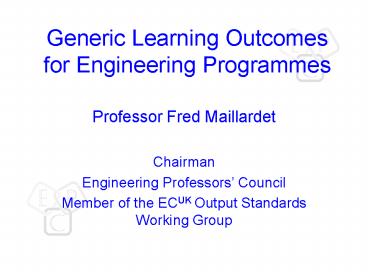Generic Learning Outcomes for Engineering Programmes - PowerPoint PPT Presentation
1 / 21
Title:
Generic Learning Outcomes for Engineering Programmes
Description:
Knowledge....particular equipment, processes, and workshop and ... learning ....greater exercise of leadership ....ability to ... of commercial risks ... – PowerPoint PPT presentation
Number of Views:39
Avg rating:3.0/5.0
Title: Generic Learning Outcomes for Engineering Programmes
1
Generic Learning Outcomes for Engineering
Programmes
- Professor Fred Maillardet
- Chairman
- Engineering Professors Council
- Member of the ECUK Output Standards Working Group
2
Introduction
- Chartered Engineer
- BEng (Hons) plus Masters or Further Learning
- Integrated MEng Degree
- Incorporated Engineer
- Bachelors Degree in Engineering
- HNC/D or Foundation Degree plus Further Learning
3
Definitions
- Awareness.general familiarity, sometimes within
a specific discipline. - Knowledge.info that can be recalled
- Skills.learned attributes which can be applied
almost automatically - Understanding.capacity to use concepts
creatively in analysis, problem solving, design,
etc
4
General Learning Outcomes
- Knowledge and Understanding
- Intellectual Abilities
- Practical Skills
- General Transferable Skills
- Applicable to all registration categories and
qualification levels
5
General Learning Outcomes
- Knowledge and Understanding
- Demonstrate.essential facts, concepts, theories
and principles of their engineering discipline
and its science and maths - Appreciate.wider multidisciplinary engineering
context and principles - Appreciate.social, environmental, ethical,
economic and commercial considerations affecting
engineering judgement
6
General Learning Outcomes
- Intellectual Abilities
- Apply.quantitative science and engineering tools
to analyse problems - Demonstrate.creative and innovative ability to
synthesise and formulate designs - Comprehend.the broad picture and work at the
appropriate level of detail
7
General Learning Outcomes
- Practical Skills
- Possess.via real experience in labs, workshops,
industry, individual and group project work,
design work, and/or use of computer software - Evidence of group working and participation in a
major project important
8
General Learning Outcomes
- General Transferable Skills
- Develop.suitable for a wide range of situations
- Include problem solving, communication, effective
use of IT and info retrieval skills - Include planning and improving own
performance.lifelong learning/CPD
9
Specific Learning Outcomes
- Underpinning Science and Mathematics
- Engineering Analysis
- Design
- Economic, Social and Environmental context
- Engineering Practice
- Presented for Bachelors (Honours) level for CEng
registration
10
Specific Learning Outcomes
- Underpinning Science and Mathematics - as defined
by the relevant engineering institution - Knowledge and understanding.scientific
principles necessary in the discipline - Knowledge and understanding. appropriate maths
to apply methods, tools and notations
proficiently - Apply and integrate.other engineering
disciplines into their own
11
Specific Learning Outcomes
- Engineering Analysis
- Understand.relevant engineering principles and
how to apply them - Identify, classify and describe.system
performance thro analysis and modelling - Apply.appropriate quantitative methods and
computer software to solve problems - Understand and apply.systems approach to
engineering problems
12
Specific Learning Outcomes
- Design
- Define.problem and identify constraints
including environmental and sustainability
limitations, health and safety, and risk assesst - Understandcustomer and user needs
- Identify and manage.cost drivers
- Use creativity.to establish solutions
- Ensure.fitness for purpose including production,
operation, maintenance and disposal - Manage.design process and evaluate outcomes
13
Specific Learning Outcomes
- Economic, Social and Environmental Context
- Knowledge and understanding. commercial and
economic context of engineering - Knowledge.management techniques
- Understand.sustainable development
- Aware.relevant legal requirements including
personnel, health, safety and risk - Understand.professional and ethical conduct
14
Specific Learning Outcomes
- Engineering Practice
- Knowledge.particular equipment, processes, and
workshop and practical skills - Understand.use of technical data
- Aware.IPR and contractual issues
- Understand.appropriate codes of practice
- Aware.quality issues
- Ability.work with technical uncertainty
15
MEng Enhancement
- General Learning Outcomes
- Increased level of complexity of problems
encountered - General Transferable Skills reflect
.planning to anticipate change
.more independent learning
.greater exercise of leadership
.ability to work and learn in
unfamiliar situations
16
MEng Enhancement
- Specific Learning Outcomes
- More comprehensive understanding. including some
external to engineering - Awareness.new and emerging technologies
including ICT - More innovative design work
- Deeper evaluation of commercial risks
- Greater understanding of the range of engineering
materials
17
IEng Programmes
- General Learning Outcomes as for CEng
- Specific Learning Outcomes reflect
- Greater weighting on knowledge and understanding
of engineering practice and processes, and
maintenance and management of current technology - Less weighting on analysis
- Design weighted to meet defined needs
18
Further Learning
- Alternative Masters Degrees must
- meet the QAA descriptors for M level
- be acceptable to the relevant Engineering
Institution - satisfy the appropriate competence statements
19
Conclusions
- Embedding a focus on outcomes rather than input
- Reducing/eliminating multiple guidelines
- Helping to articulate realistic accreditation
requirements - Establishing a structured framework within which
to debate Bologna
20
Questions
- What is your immediate reaction to the Output
Standards for Accredited Academic Programmes? - Do the advantages and disadvantages identified
earlier still apply? - How can we address the apparent disadvantages?
21
Actions?
- What action is now required from
- the ECUK, LTSN Engineering, EPC, etc.
- What action should be put in place
- with the Professional Bodies?
- with the HEIs?
- with employers?
- with potential students?
- with Governmental bodies?




























